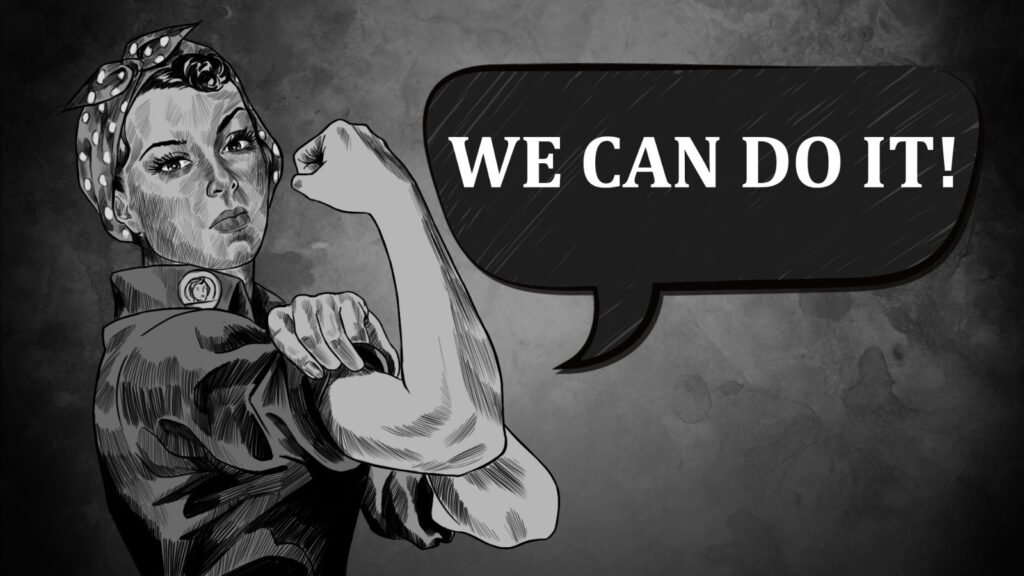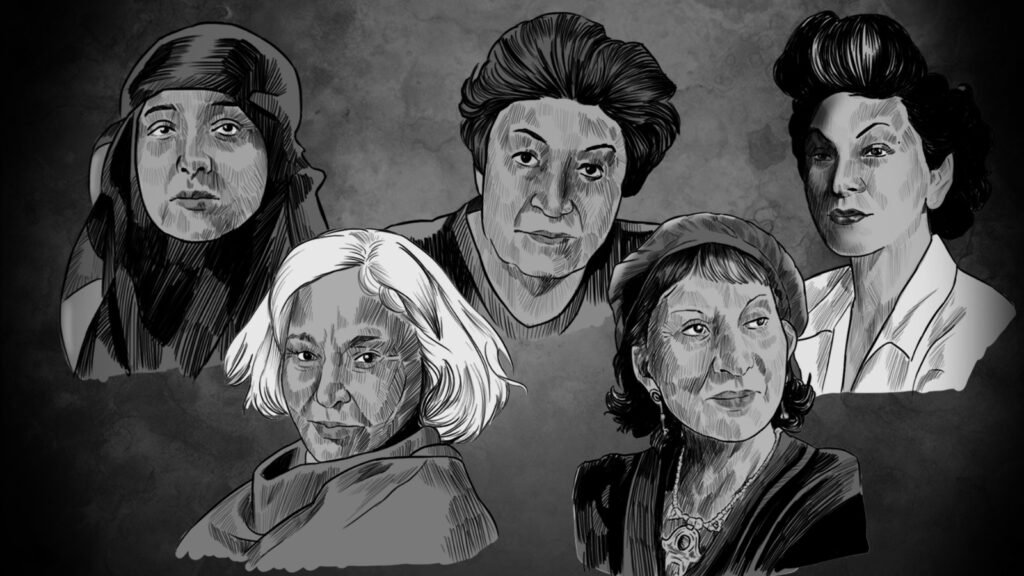Conservative societies agree on the importance of the family’s role compared to the individual’s role, unlike capitalist societies that support individual ambition to achieve the greatest successes. This is reflected in increased buying and selling rates, making everything, including individuals, part of this market. Undoubtedly, feminism had its beginnings in the capitalist West.
The Feminist Movement in the West
The initial steps to transition women from their familial surroundings to the workforce began with the Industrial Revolution in Europe in the mid-18th century. The pace of women’s employment increased during the 20th century, particularly during the two World Wars, due to the absence of many men on the battlefronts, necessitating women’s employment to fill this gap.
Western women quickly recognized the injustice in wage distribution, sparking women’s liberation movements demanding voting rights and equal pay. However, the major turning point came with the 1968 upheavals in France, which called for dismantling all religious, political, and social symbols, with no reference to the church, political class, or the family, particularly the father’s role.
This marked the beginning of demands for absolute equality, not only in rights and duties but also in biological makeup. The words of the French philosopher Simone de Beauvoir resonated widely. She explained her philosophy: “One is not born a woman, but becomes one” due to family upbringing and the surrounding environment. This means that the gender one is born with does not determine anything, and gender identity can be chosen by the individual according to their preference.
A deep alliance developed between the feminist movement, individualistic capitalism, and the LGBTQ+ community, which classifies individuals as homosexual, bisexual, transgender, and questioning.
This alliance also fostered a profound hostility toward religions that criminalize any sexual relationships outside of marriage.
Thus, a man choosing a feminine lifestyle or vice versa became acceptable. These ideas marked the beginning of a deep alliance between the feminist movement and homosexuality, as well as with capitalism, which encourages women to work as a labour force, and the fashion, makeup, and dietary trends industries.
The Failure to Define “Woman”
The feminist thought in rejecting any gender distinction leads to its failure to define what a woman is, considering that the biological sex has no value and that an individual can choose their gender. In the film “What is a Woman?” produced in 2022, American filmmaker Matt Walsh attempts to find a definition for a woman, which none of his guests could provide.
The feminist movement in the West has gone through four waves. The first wave occurred in the 19th and early 20th centuries, following the Industrial Revolution and the two World Wars, during which women entered the workforce in large numbers to compensate for the absence of men. The focus during this period was on demanding the right to vote, the right to own property, financial independence from men, and education.
The second wave occurred in the mid-20th century following the upheavals in France in 1968 and the subsequent sexual revolution led by the hippies. Voices rose demanding sexual freedom for both genders, women’s right to abortion, and equal pay with their male colleagues.
Between the 1990s and the early 21st century, a third wave emerged, advocating for network feminism through communication and spreading feminist ideas widely.
The fourth wave began in the first decade of the 21st century, using social media and digital platforms to rally masses who could adopt their ideas.
The feminist movement in the West is characterized by selectiveness. For instance, the right of women to co-education in Afghanistan sparks protests and condemnation seminars. Yet, their right to healthcare, which has deteriorated due to Western economic sanctions, elicits little response. Similarly, the plight of Palestinian women, who are shot while carrying a white flag to cross a street seeking shelter from Israeli bombardment, goes largely unnoticed. To the Western feminist movement.
It seems the thousands of unarmed women who have been martyred in Palestine are merely numbers not worth urgent denunciation.
The feminist movement in Western societies has led to a significant decline in family formation and an unprecedented rise in men avoiding marriage and its responsibilities, opting instead to satisfy their sexual desires without constraints or commitments. This trend has been accompanied by an increase in women’s association with poverty due to the widespread phenomenon of single motherhood.
Economically, Europe has been suffering from a recession due to a decline in the workforce caused by a generational decrease in birth rates. This has resulted in a gradual collapse of the demographic pyramid, with a higher proportion of the elderly compared to the youth, posing a direct threat to pension and healthcare systems, and impacting the market as a whole due to a reduced number of consumers.
With feminism aligning with capitalism, which promotes individual values and encourages women to leave their familial roles to work in factories and offices to meet the demands of mass production and corporate profits, women have become increasingly dissatisfied with their appearance. Compared to extremely thin fashion models, women feel the need to conform to rigid, extreme dieting, and apply layers of makeup that not only clog the pores of their skin but perhaps even the windows to their soul.
On a psychological level, children in the West no longer find security or role models due to the absence of the father, whose role has been reduced to that of a mere sperm donor. The single mother struggles alone with feelings of depression in the absence of a father who is voluntarily or forcibly absent, leaving little chance for a substitute father figure for her child. Western women have often become mere means for satisfying male desires.
The West could have avoided all these negative effects by supporting family formation, but this goal remains elusive amidst rampant sexual promiscuity.

Feminism in the Arab World
Arab feminists cannot criticize homosexuality, as they consider the West an absolute, almost sacred, model to be followed.
It’s true that there are various forms of oppression faced by women in the Arab world, but these are generally authoritarian oppressions faced by both men and women. There is no justification for antagonizing men for being men, oppressing women for being women or following the West in the manufactured gender conflict. In Islam, men and women complement each other, and women’s human, political, financial, and educational rights have been preserved since the early days of Islam.
The relatively limited manifestations of women’s oppression in the Arab world stem from a general climate of distorted male-centric religious understanding. Efforts are underway to correct this and other misconceptions through educational campaigns that aim to correct men’s understanding of women’s true status in Islam and women’s understanding of their noble role in shaping humanity.
In 2009, Qatar ratified the United Nations Convention on the Elimination of All Forms of Discrimination Against Women through Decree No. 28. The first part of the convention, from articles one to six, focuses on non-discrimination between genders and the rejection of trafficking in women.
The second part, with Articles 7 to 9, focuses on women’s rights in society, particularly in the political sphere.
The third part, with Articles 10 and 11, outlines women’s economic and social rights, especially in the fields of work, education, and health.
The fourth part, with Articles 15 and 16, emphasizes gender equality in marriage and legal matters.
The fifth part, with Articles 17 to 22, details the mechanisms for establishing a committee to eliminate discrimination against women and report on it.
The final part, with Articles 23 to 30, clarifies administrative aspects of the convention, its impact on other agreements, and how it is to be implemented.

In an interview conducted by Qawl Fassel Online Magazine with Dr Amal Al-Malki, the founding dean of the College of Humanities and Social Sciences at Hamad Bin Khalifa University and a member of the Qatar Foundation, she discussed the concept of women’s empowerment. Dr Al-Malki stated that “empowerment” refers to providing all the conditions that allow a person, whether a woman or a man, to achieve their various ambitions and capabilities within a system that grants them freedom, ensures their security, and guarantees their human dignity. When we talk about women’s empowerment, it is viewed through the following interconnected and cumulative fields: social empowerment, legal empowerment, economic empowerment, and political empowerment.”
However, she added that “empowerment has become a flexible term that is often used out of context. Before discussing women’s empowerment in any field, we must realistically consider the circumstances surrounding women. For example, when a woman belongs to a social class that views her work as shameful and her leaving the house as contrary to inherited principles, talking about economic empowerment for women is incomplete.”
From an economic perspective, Dr Al-Malki believes that “when a woman is part of a legal system that does not guarantee her right to equal pay or protection from harassment in the workplace through specific legislation, economic empowerment seems like a joke to me. If a woman belongs to a society that does not trust her ability to make decisions regarding her education, work, marriage, and mobility, how can we talk about political empowerment, which means putting a woman in a position where she makes decisions for others?”
When asked about the extent to which women have achieved their ambitions in the Gulf and the Arab world, Dr Al-Malki said, “Gulf women have certainly achieved many of their ambitions, whether in education or economics. We see that Gulf women have proven their capabilities in various fields and have reached high academic and practical levels. The number of female graduates from universities now exceeds that of men.”
Regarding work, she believes that “women have become essential partners in the labour market, not out of luxury, but because their role has become crucial in covering living expenses for their families. Compared to Arab women, Gulf women belong to politically and economically stable countries, so it is natural for them to enjoy the facilities that have helped showcase their energies and capabilities.”
As for women’s rights, Dr. Al-Malki stated, “Gulf women, like Arab women, have incomplete rights. In many Arab countries, the law does not see women as equal to men as citizens, thereby diminishing their rights. Men still enjoy more rights than women, even though most Arab constitutions stipulate equality between men and women in rights and duties.”
Among the incomplete rights of women in the Arab world, according to Dr. Al-Malki, is that “women in most of our Arab countries cannot pass their nationality to their children, for example. Laws do not grant them protection rights; many countries lack laws that protect women from violence inside and outside the home. Personal status laws are old and outdated and do not keep up with the times. Women’s political participation in the Arab world remains among the lowest in the world.”
Regarding the meaning of gender equality, Dr Al-Malki said, “It is the demand for social justice by considering women as human beings first, and then as citizens with all the citizenship rights that men have. Men and women are not biologically equal, certainly. Each society has its own peculiarities, and each family has its priorities. Women have the right to adhere to these peculiarities and priorities if they choose, and it does not diminish them.”
Dr. Al-Malki added, “As a citizen, a woman should have the right to political, economic, and social representation like men. She should have the right to demand the activation of the constitution that stipulates her equality with men in all aspects of life. I emphasize that demanding equality between men and women does not weaken countries nor affect family cohesion. On the contrary, equality strengthens the national economy and family relationships because they will be built on love, respect, and justice.”
Islamic Feminism
Some Muslims believe that there is a possibility of reconciling feminist thought with Islamic thought by demanding a reinterpretation of religious texts and rejecting any discrimination between males and females. However, some see this as a Trojan horse to undermine Islam from within.
Some question whether Muslim feminists would demand that women exempt men from dowries, marriage costs, and financial support. Do they view women as having rights without responsibilities? Can a society based on taming men through conflict be envisioned? Conversely, is feminizing society less dangerous than male dominance? How can children raised in conflicting families be well-adjusted?
The Conflict Between Feminism and the Role of Women in the Family
With the collapse of the family structure as a reaction to capitalist ideas and subsequent feminist movements, men are liberated from religious and societal responsibilities, leaving the entire burden on women who work outside the home and raise children without any role from men.
The alternative to this strain is a significant decline in birth rates, which directly threatens the demographic pyramid. Within a few years, this led to the collapse of health insurance and pension systems, accompanied by rising recession rates. War becomes a bitter economic option adopted by politicians to stimulate the economy, akin to burning crops to plant new ones.
Is this cycle of wars, temporarily interrupted by periods of false peace, considered a humane solution for human existence?




